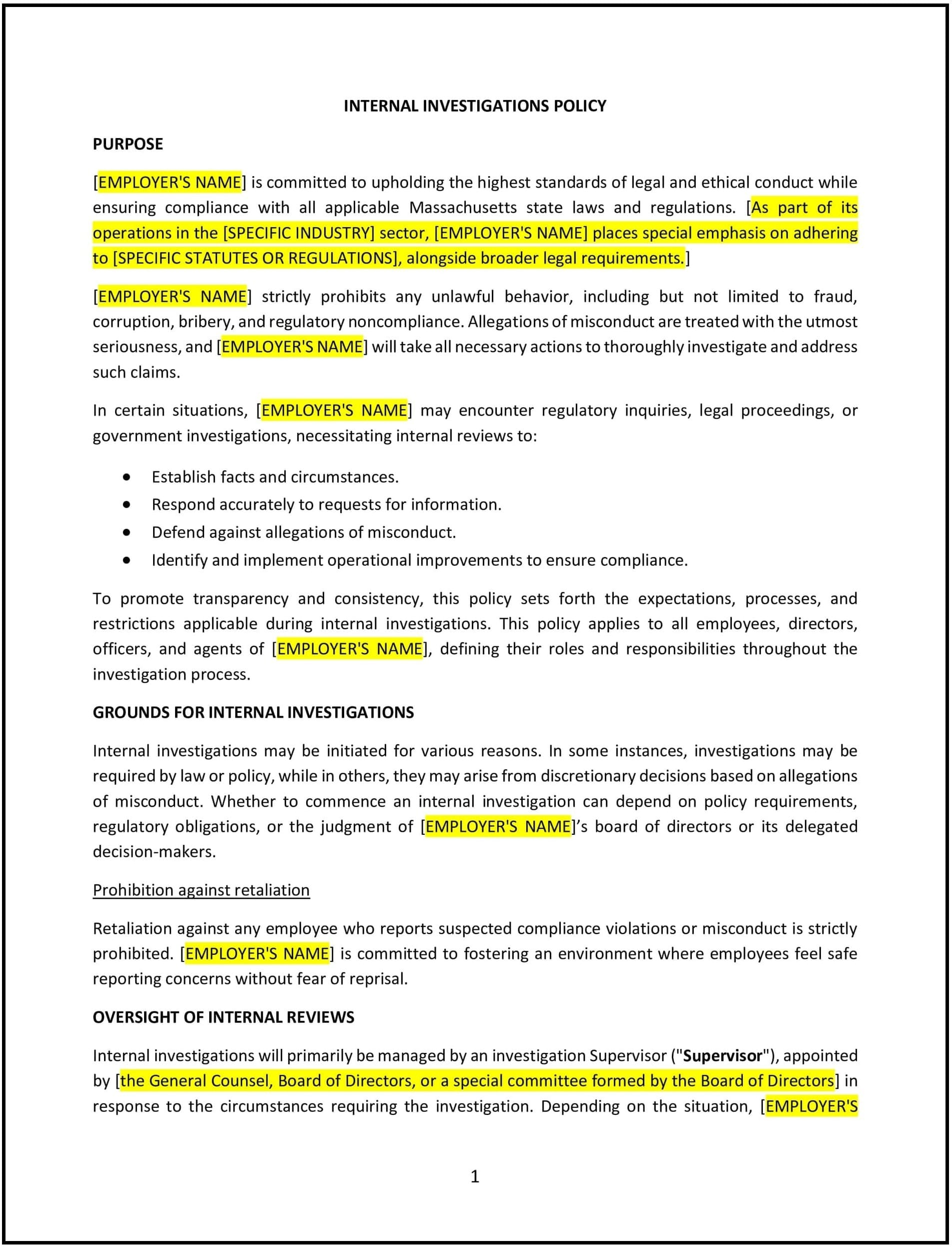Internal investigations policy (Massachusetts): Free template
Got contracts to review? While you're here for policies, let Cobrief make contract review effortless—start your free review now.

Customize this template for free
This internal investigations policy is designed to help Massachusetts businesses address and manage workplace investigations in a fair, consistent, and legal manner. The policy outlines the procedures for conducting internal investigations into allegations of misconduct, harassment, discrimination, theft, or other violations of company policy. It establishes the roles and responsibilities of management, HR, and employees during an investigation and ensures that investigations are conducted in accordance with Massachusetts state laws and federal regulations.
By adopting this policy, businesses can ensure that investigations are handled impartially, employees' rights are respected, and any violations of company policies are addressed effectively.
How to use this internal investigations policy (Massachusetts)
- Define the scope of investigations: Specify what types of incidents or allegations the policy covers, such as harassment, discrimination, theft, safety violations, or other breaches of company policy. The policy should outline the types of behavior that may trigger an internal investigation.
- Outline the investigation process: Provide a step-by-step guide for conducting an internal investigation. This includes receiving and documenting complaints, identifying the parties involved, gathering evidence, interviewing witnesses, and reviewing relevant documents. The policy should specify timelines for each stage of the investigation.
- Assign investigation responsibilities: Clearly define who is responsible for managing and overseeing investigations. This may include HR personnel, management, or an external investigator. The policy should specify who will conduct interviews, make decisions, and ensure that the process is fair and unbiased.
- Maintain confidentiality: Stress the importance of confidentiality during the investigation process. Employees involved in the investigation should be reminded not to discuss the matter with others, and the company should ensure that sensitive information is protected throughout the investigation.
- Provide protection against retaliation: Specify that employees who participate in an investigation, whether as a complainant, witness, or respondent, will be protected from retaliation. The policy should make clear that any retaliatory actions will not be tolerated and will be subject to discipline.
- Outline corrective actions: After the investigation is completed, the policy should explain how decisions will be made regarding corrective actions, including disciplinary measures, counseling, or policy changes. The policy should specify the potential outcomes of an investigation, depending on the findings.
- Ensure compliance with Massachusetts and federal laws: Ensure that the policy complies with Massachusetts state laws, such as the Massachusetts Fair Employment Practices Law, and federal regulations, including Title VII of the Civil Rights Act of 1964, which prohibits discrimination and harassment in the workplace.
- Review and update regularly: Periodically review and update the policy to reflect changes in laws, business operations, or industry standards.
Benefits of using this internal investigations policy (Massachusetts)
This policy offers several benefits for Massachusetts businesses:
- Promotes fairness and consistency: A clear and structured internal investigations process helps ensure that all investigations are handled consistently and fairly, regardless of the individuals involved.
- Reduces legal risks: By following a documented process for internal investigations, businesses can improve compliance with Massachusetts state laws and federal regulations, reducing the risk of legal challenges or complaints.
- Protects employee rights: The policy ensures that employees’ rights are protected throughout the investigation process, including their right to confidentiality, a fair process, and protection from retaliation.
- Improves company culture: A transparent and fair investigation process helps to maintain trust within the workplace, demonstrating the company’s commitment to addressing issues fairly and maintaining a respectful work environment.
- Enhances the company’s reputation: Companies that handle internal investigations in a responsible and legally compliant manner are seen as employers of choice, attracting top talent and maintaining a positive public image.
- Prevents workplace misconduct: By addressing allegations promptly and thoroughly, businesses can prevent misconduct from escalating and create a safer and more respectful workplace.
Tips for using this internal investigations policy (Massachusetts)
- Communicate the policy clearly: Ensure that all employees are aware of the internal investigations policy and understand how to report concerns or complaints. This can be done through employee handbooks, orientation programs, or internal communications.
- Provide training to managers and HR: Offer training for managers and HR personnel on how to conduct fair and thorough investigations, how to maintain confidentiality, and how to avoid retaliation. This will help ensure that investigations are handled correctly and impartially.
- Be thorough and impartial: Ensure that investigations are conducted objectively, with all parties having an opportunity to provide input. Gather all relevant evidence, interview all witnesses, and make decisions based on the facts.
- Document all steps of the investigation: Keep detailed records of each stage of the investigation, including any complaints, interviews, evidence, and findings. This will help ensure that the process is transparent and defensible in case of a legal challenge.
- Foster a safe reporting environment: Encourage employees to report misconduct or violations without fear of retaliation. Make sure that employees feel comfortable coming forward with their concerns and know how to access support during the investigation process.
- Review and update regularly: Periodically review the policy to ensure it remains compliant with Massachusetts state laws, federal regulations, and the company’s evolving needs. Make updates as necessary to reflect changes in legal requirements or best practices.